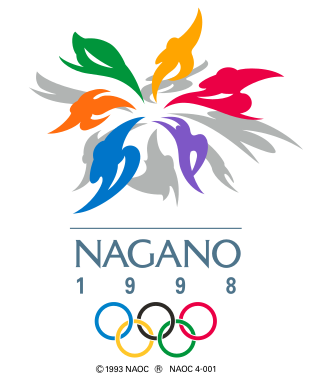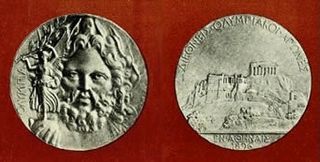
The Winter Olympic Games is a major international multi-sport event held once every four years for sports practiced on snow and ice. The first Winter Olympic Games, the 1924 Winter Olympics, were held in Chamonix, France. The modern Olympic Games were inspired by the ancient Olympic Games, which were held in Olympia, Greece, from 776 BCE to 394 CE. The Baron Pierre de Coubertin of France founded the International Olympic Committee (IOC) 1,500 years later in 1894, leading to the first modern Summer Olympic Games in Athens, Greece in 1896. The IOC is the governing body of the Olympic Movement, with the Olympic Charter defining its structure and authority. The original five Winter Olympic Sports were bobsleigh, curling, ice hockey, Nordic skiing, and skating. The Games were held every four years from 1924 to 1936, interrupted in 1940 and 1944 by World War II, and resumed in 1948. Until 1992, the Summer Olympic Games and the Winter Olympic Games were held in the same year. A decision to change this was made in 1986, when during the 91st International Olympic Committee session, IOC members decided to alternate the Summer Olympic Games and the Winter Olympic Games on separate four-year cycles in even-numbered years. Also, at that same congress it was decided that 1992 Winter Olympics would be the last to be held in the same year as the Summer Games and that to change the rotation, the games that would be held in 1996 would be brought forward by two years, being scheduled to 1994. After those games, the next were to be held in 1998 when the four-year Olympic Cycle resumed.

The 1998 Winter Olympics, officially known as the XVIII Olympic Winter Games and commonly known as Nagano 1998, were a winter multi-sport event held from 7 to 22 February 1998, mainly in Nagano, Nagano Prefecture, Japan, with some events taking place in the nearby mountain communities of Hakuba, Karuizawa, Nozawa Onsen, and Yamanouchi. The city of Nagano had previously been a candidate to host the 1940 Winter Olympics, as well as the 1972 Winter Olympics, but had been eliminated at the national level by Sapporo on both occasions.

An Olympic medal is awarded to successful competitors at one of the Olympic Games. There are three classes of medal to be won: gold, silver, and bronze, awarded to first, second, and third place, respectively. The granting of awards is laid out in detail in the Olympic protocols.
The 1960 Summer Olympics medal table is a list of National Olympic Committees ranked by the number of medals won during the 1960 Summer Olympics, held in Rome, Italy from August 25 to September 11, 1960.
The 1928 Winter Olympics medal table is a list of National Olympic Committee's nations ranked by the number of medals won during the 1928 Winter Olympics, held in St. Moritz, Switzerland from February 11 to February 19, 1928. A total of 464 athletes from 25 countries participated in these Games, competing in 14 events in 6 disciplines.

Australia has sent athletes to every Summer Olympic Games, as well as every Winter Olympics except 1924–32 and 1948. In 1908 and 1912 Australia competed with New Zealand under the name Australasia.

The Union of Soviet Socialist Republics (USSR) first participated at the Olympic Games in 1952, and competed at the Summer and Winter Games on 18 occasions subsequently. At six of its nine appearances at the Summer Olympic Games, the Soviet team ranked first in the total number of gold medals won, second three times, and became the biggest contender to the United States' domination in the Summer Games. Similarly, the team was ranked first in the gold medal count seven times and second twice in its nine appearances at the Winter Olympic Games.
The men's ice hockey tournament at the 1992 Winter Olympics in Albertville, France, was the 17th Olympic Championship. The games were played at the Méribel Ice Palace in Méribel, about 45 km from host city Albertville. The competition, held from 9 to 23 February, was won by the Unified Team in its only appearance. The team was composed of some newly emerged nations from the former Soviet Union, which had dissolved just weeks before the Games began. Canada won the silver medal, its first hockey medal since 1968 and 11th Olympic ice hockey medal.

Hungary first participated at the Olympic Games at the inaugural 1896 Games, and has sent athletes to compete in most Summer Olympic Games and every Winter Olympic Games since then. The nation was not invited to the 1920 Games for its role in World War I, and was part of the Soviet-led boycott of the 1984 Summer Olympics.

The United Kingdom has been represented at every modern Olympic Games. As of the 2020 Summer Olympics, it is third in the all-time Summer Olympic medal table by both number of gold medals won and overall number of medals. London hosted the Summer Olympic Games in 1908, 1948 and 2012.

Italy has sent athletes to most of the modern Olympic Games held since 1896, outside of not having officially participated in the 1904 Summer Olympics.

The modern Olympic Games were founded by French historian Pierre de Coubertin. France has competed in every edition, with the possible exception of the 1904 Games.

Brazil first participated at the Olympic Games in 1920, after missing the previous five Summer editions. The country has sent athletes to compete in every Summer Olympic Games since then, except for the 1928 Games. As of 2024, Brazilian athletes have won a total of 170 medals in 18 different Summer sports.

Japan first participated at the Olympic Games in 1912, and has competed at almost every Games since then. The nation was not invited to the 1948 Games after World War II, and was part of the American-led boycott of the 1980 Summer Olympics in Moscow.

Athletes from Germany (GER) have appeared in only 20 of the 22 editions of the Winter Olympic Games as they were not invited to two events after the World Wars, in 1924 and 1948. Germany hosted the 1936 Winter Olympics in Garmisch-Partenkirchen and had been selected to host in 1940 again.

Originally having participated in Olympics as the delegation of the Republic of China (ROC) from 1924 Summer Olympics to 1976 Winter Olympics, China competed at the Olympic Games under the name of the People's Republic of China (PRC) for the first time at the 1952 Summer Olympics held in Helsinki, Finland, although they only arrived in time during the last days to participate in one event. That year, the International Olympic Committee (IOC) allowed both the PRC and ROC to compete with the name "China", although the latter withdrew in protest. Due to the dispute over the political status of the "two Chinas", the PRC started a period of isolationism, withdrawing from several international sporting bodies and the UN system until the mid-1970s, when the country participated for the first time in the Asian Games in 1974 and the World University Games in 1977. Returning to the IOC officially only in 1979, which gave it the right to send an official delegation, starting from the 1980 Winter Olympics in Lake Placid, United States. Their first appearance at the Summer Olympic Games after 1952 was the 1984 Summer Olympics in Los Angeles, United States. The People's Republic of China staged boycotts of the Games of the XVI Olympiad in Melbourne, Australia, Games of the XVII Olympiad in Rome, Italy, Games of the XVIII Olympiad in Tokyo, Japan, Games of the XIX Olympiad in Mexico City, Mexico, Games of the XX Olympiad in Munich, Germany, and Games of the XXI Olympiad in Montreal, Canada. China also boycotted the Games of the XXII Olympiad in Moscow, Soviet Union due to the American-led boycott and the ongoing Sino-Soviet split, together with the other countries.

Canada has sent athletes to every Winter Olympic Games and every Summer Olympic Games since its debut at the 1900 games with the exception of the 1980 Summer Olympics, which it boycotted along with the USA and other countries. Canada has won at least one medal at every Olympics in which it has competed. The Canadian Olympic Committee (COC) is the National Olympic Committee for Canada.

Indonesia is a member of the Southeast Asian Zone of the Olympic Council of Asia (OCA), and has competed in all editions of the Asian Games since it was first held in 1951, one of only seven countries to do so.
The 2012 Winter Youth Olympics medal table is a list of National Olympic Committees (NOCs) ranked by the number of gold medals won by their athletes during the 2012 Winter Youth Olympics, held in Innsbruck, Austria, from January 13 to January 22, 2012. Approximately 1,059 athletes from 70 NOCs participated in 63 events in 15 sports.














